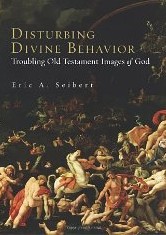 This is the second in a series reviews on books that address the problem of God behaving badly in the Old Testament. This review was originally published in the Southeastern Theological Review, vol 1 (2010), pages 67-68.
This is the second in a series reviews on books that address the problem of God behaving badly in the Old Testament. This review was originally published in the Southeastern Theological Review, vol 1 (2010), pages 67-68.
Eric A. Seibert, Disturbing Divine Behavior: Troubling Old Testament Images of God (Minneapolis: Fortress, 2009).
While people of faith typically ignore Old Testament texts that portray God as violent, angry or destructive, in this book Seibert boldly engages these problematic texts. He thinks it is crucial to examine disturbing divine behavior in the OT and develop principles to understand and interpret these texts. He argues convincingly that it is important to think rightly about God because a person’s view of God will shape not only their relationship with God, but also their own behavior.
In his introduction (pp. 1-12), Seibert narrates how he became interested in the Old Testament and specifically in the problem of its violent portrayal of God. He explains why he focuses on narrative texts (more familiar, more straightforward) and why it is important to ask questions of the text about its portrayal of God. Seibert begins chapter one (pp. 15-34) by listing many of the troubling texts by category and then moves on in chapter two (pp. 35-52) to discuss the perspectives of various groups of people who have problems with the OT’s portrayal of God including pacifists, feminists, the dispossessed, atheists and people of faith. In chapters three and four he examines approaches to the problem, both ancient (e.g., changing, rejecting or salvaging the OT) and modern (e.g., divine immunity, just cause, greater good, permissive will) showing how none are fully adequate (pp. 53-88).
In chapters five and six (pp. 91-129) he first raises questions about the historicity of the OT using both biblical and archaeological evidence, and then addresses many of the concerns raised by asking the historical question. Chapter seven (pp. 131-144) explains why OT narratives were written and chapter eight (pp. 145-166) discusses the theological worldview of ancient Israel. Chapters nine through twelve (pp. 169-242) lay out Seibert’s strategy for reading these texts responsibly: distinguish between the textual and actual God, use a Christocentric hermeneutic, use discernment and stop ignoring troubling texts.
In the appendices he discusses the theme of violence in the New Testament and the inspiration of Scripture (pp. 243-280). He also includes an extended section of endnotes and exhaustive bibliography (pp. 281-334) as well as indices of biblical references and modern authors (pp. 335-347).
Many evangelicals will find Seibert’s provocative titles for the role of God in chapter one as offensive (e.g., God as Mass Murderer, Genocidal General, Dangerous Abuser), but what is more disturbing is that he does not discuss in depth most of the problematic texts he lists in chapter one. After his initial extensive list, he does little in the first eight chapters to help OT readers actually study and make sense of God’s troubling behavior in these passages. His aversion to “justifying God” prevents him from taking these texts seriously and examining them within their biblical context. For example, Seibert claims that within the text God often “kills indiscriminately” (p. 32), however in the examples he cites the text does give reasons for the judgment but he either ignores or glosses over them.
Additionally, his Christocentric hermeneutical solution to the problem which he finally lays out in Part Three (chs. 9-12) is unsatisfactory. He argues that OT passages that describe a violent God can be rejected since that behavior is inconsistent with the character of God as revealed by Jesus in the gospels. His conclusion is attractive since the problem of a violent OT God conveniently disappears, but many readers of the OT (myself included) will be unwilling to reject large sections of the OT because the God it portrays does not fit a certain perception of what he supposedly should be like. Seibert claims that his rejection of these violent texts does not make him a Marcionite (pp. 211-212), but his approach still smacks of Marcionism since it deems significant portions of the OT as unreliable. To some readers of the OT (particularly Jewish), his Christocentric criterion for rejection may seem arbitrary. Why not reject portrayals of Jesus that seem incompatible with the character of Yahweh? Also, his perspective of Jesus as non-violent does not always fit the New Testament, as Jesus speaks about hell and judgment more than any other character in Scripture.
While evangelicals will have significant problems with his view of Scripture, he is to be commended for a well-written and thoroughly researched discussion of an important, but often ignored subject.
What do you think about Seibert’s thesis (ideally after you’ve read his book, but if not, after my summary)?
